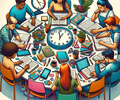
Summary of 16 Best Study Methods in 2023
Studying can be a daunting task, but it is an essential part of academic and personal development. Everyone learns differently, and what works for one person may not work for another. In this blog post, we'll explore 20 different study methods that you can try to improve your learning experience.
Anki or Other Spaced Repetition Systems
Anki is a computer program that allows you to make flashcards and schedule reviews to maximize retention. By studying for a few minutes each day, you can develop an almost photographic memory.
Explain Concepts to a Stuffed Animal
For complex topics that require an understanding of concepts, try verbalizing them to a stuffed animal. This will help you form words that make sense together and identify areas where you may have misunderstood.
Study Groups
If you struggle to stay focused or motivated when studying alone, try joining a study group. You can discuss concepts and quiz each other to reinforce your understanding.
Pomodoro Technique
The Pomodoro Technique involves breaking your study session into 25-minute intervals with short breaks in between. This can help you stay focused and avoid burnout.
Feynman Technique
The Feynman Technique involves simplifying complex concepts by explaining them as if you were teaching someone who has no knowledge of the topic. This helps you identify areas where you may be struggling to understand.
Active Reading
Active reading involves engaging with the material by highlighting, underlining, and taking notes as you read. This can help you retain information and identify important concepts.
Mind Mapping
Mind mapping involves creating a visual diagram of the relationships between different concepts. This can help you see connections between different ideas and improve your understanding.
Flashcards
Flashcards can be a quick and easy way to memorize facts and figures. By regularly reviewing your flashcards, you can improve your retention and recall.
Mnemonic Devices
Mnemonic devices are memory aids that help you remember information by associating it with a memorable phrase or image. These can be particularly helpful for memorizing lists or sequences.
Cornell Method
The Cornell Method involves dividing your notes into three sections: a cue column, a note-taking column, and a summary section. This can help you organize your notes and reinforce your understanding.
SQ3R Method
SQ3R stands for Survey, Question, Read, Recite, and Review. This method involves scanning the material, generating questions, reading actively, recalling information, and reviewing to improve retention.
Retrieval Practice
Retrieval practice involves actively recalling information from memory to reinforce your learning. This can be done through quizzes, flashcards, or other techniques that require you to actively remember information.
Chunking
Chunking involves breaking down large amounts of information into smaller, more manageable pieces. This can help you process the material more easily and improve your retention.
Writing
Writing can be a powerful tool for reinforcing your learning. By summarizing key concepts and writing about how they relate to each other, you can improve your understanding and retention.
Multi-Sensory Learning
Multi-sensory learning involves engaging with the material through different senses, such as sight, sound, and touch. This can help you retain information more effectively.
Practice Testing
Practice testing involves quizzing yourself on the material to reinforce your learning. This can be done through flashcards, quizzes, or others. Testudy allows you to generate tests from any reading material and for any subject.
Wrapping up
Whatever it is that you'll choose, your best bet is switching study methods when old practices are getting stale. This will help you avoid the forgetting curve (which is the phenomenon of forgetting information over time. Ebbinghaus found that within a day of learning new information, we forget about 50% of it. This is why it is important to revisit the material over time). You won't be getting bored with doing the same stuff, and you'll be highlighting different aspects of the material.





